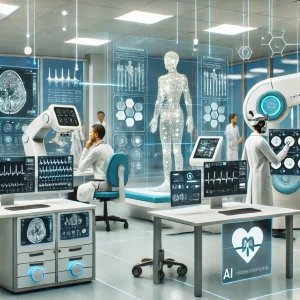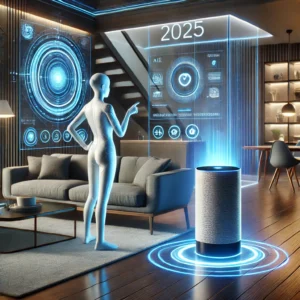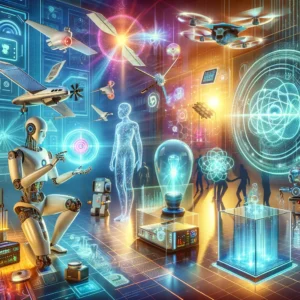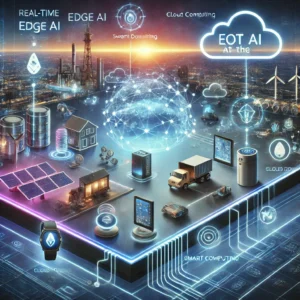Understanding the Role of AI in Healthcare Diagnostics

Understanding the Role of AI in Healthcare Diagnostics.
Discover how AI is transforming healthcare diagnostics with advanced imaging, genomics, and predictive analytics. Learn about its benefits, applications, and future trends.
Artificial Intelligence (AI) is revolutionizing healthcare diagnostics, transforming how diseases are detected, analyzed, and managed. From early detection to personalized treatment plans, AI offers unparalleled accuracy, efficiency, and cost-effectiveness. This article explores the profound impact of AI on healthcare diagnostics, its applications, benefits, challenges, and the future of medical technology.
—
1. What is AI in Healthcare Diagnostics?
AI in healthcare diagnostics refers to using machine learning algorithms, neural networks, and other AI technologies to analyze medical data. These tools assist in identifying patterns, diagnosing diseases, and providing actionable insights to healthcare professionals.
Key Features:
Data Analysis: AI processes large datasets quickly and accurately.
Predictive Analytics: Helps forecast potential health risks.
Real-time Decision Making: Offers immediate recommendations based on real-time data.
READ ALSO: Why Microchips Are the Heart of Modern Technology.
—
2. Applications of AI in Diagnostics
AI has a wide range of applications in healthcare diagnostics, significantly improving patient outcomes.
a. Medical Imaging
AI enhances the accuracy of imaging tools such as X-rays, MRIs, and CT scans.
Example: AI algorithms detect early signs of cancer in imaging scans, reducing false positives and negatives.
Alt tag for image: “AI-powered imaging system analyzing a patient’s MRI scan.”
b. Pathology
AI assists in analyzing tissue samples for diseases like cancer.
It identifies abnormalities faster and more precisely than traditional methods.
c. Genomics
AI deciphers genetic data to identify mutations linked to hereditary diseases.
Example: AI predicts the likelihood of genetic disorders, enabling proactive measures.
d. Disease Prediction
AI models predict the onset of chronic diseases such as diabetes or heart conditions.
Case Study: Deep learning models predicting heart attacks with 90% accuracy.
—
3. Benefits of AI in Healthcare Diagnostics
AI-powered diagnostics offer numerous advantages that elevate patient care.
a. Enhanced Accuracy
AI minimizes human error by analyzing medical data with precision.
Example: Detecting retinal diseases with over 95% accuracy.
b. Speed and Efficiency
AI reduces the time required for diagnosis, expediting treatment.
Example: Immediate analysis of ECGs to identify arrhythmias.
c. Cost-Effectiveness
AI systems reduce costs by streamlining diagnostic processes and minimizing unnecessary tests.
d. Personalized Care
AI tailors treatment plans based on a patient’s unique genetic and medical history.
—
4. Challenges of AI in Healthcare Diagnostics
Despite its benefits, AI faces several challenges in its adoption.
a. Data Privacy and Security
AI systems handle sensitive patient data, raising concerns about data breaches.
b. Regulatory Compliance
AI tools must adhere to strict healthcare regulations, slowing down implementation.
c. Integration with Existing Systems
Integrating AI with traditional diagnostic tools can be complex and costly.
d. Ethical Concerns
AI-driven decisions may lack transparency, leading to ethical dilemmas.
—
5. The Future of AI in Healthcare Diagnostics
The future of AI in healthcare diagnostics is promising, with advancements poised to redefine the medical landscape.
a. Predictive Healthcare
AI will enable early disease detection, reducing healthcare costs and improving outcomes.
b. AI-Powered Wearables
Wearable devices equipped with AI will monitor health metrics and alert users to potential issues.
c. Virtual Health Assistants
AI will power virtual assistants to provide instant medical advice and scheduling.
d. Integration with Robotics
AI-driven robots will assist in surgeries, enhancing precision and outcomes.
—
Conclusion
AI is a game-changer in healthcare diagnostics, bridging the gap between accuracy and efficiency. Its applications in medical imaging, genomics, and disease prediction have already saved countless lives. While challenges remain, the potential of AI to revolutionize diagnostics is undeniable. As technology continues to evolve, AI will undoubtedly play a central role in the future of healthcare.





